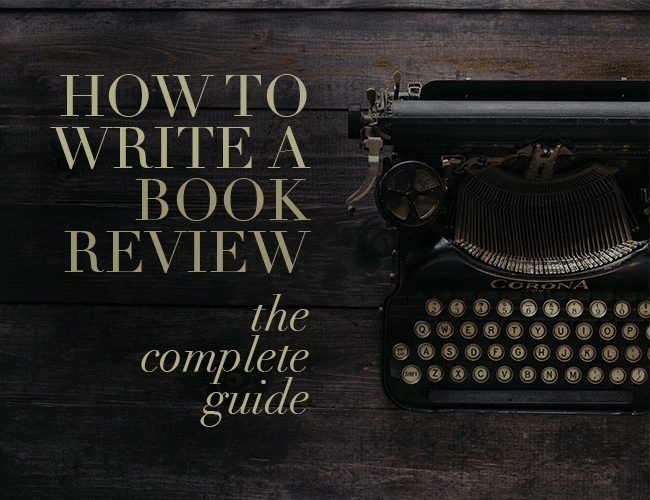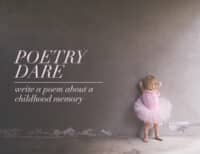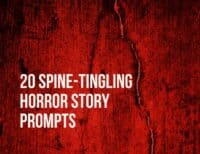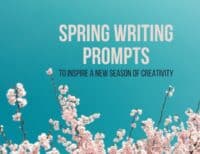If you've ever loved (or hated) a book, you may have been tempted to review it. Here's a complete guide to how to write a book review, so you can share your literary adventures with other readers more often!

You finally reach the last page of a book that kept you up all night and close it with the afterglow of satisfaction and a tinge of regret that it’s over. If you enjoyed the book enough to stay up reading it way past your bedtime, consider writing a review. It is one of the best gifts you can give an author.
Regardless of how much you know about how to write a book review, the author will appreciate hearing how their words touched you.
But as you face the five shaded stars and empty box, a blank mind strikes. What do I say? I mean, is this a book really deserving of five stars? How did it compare to Dostoevsky or Angelou or Dickens?
Maybe there’s an easier way to write a book review.
Want to learn how to write a book from start to finish? Check out How to Write a Book: The Complete Guide.
The Fallacy of Book Reviews
Once you’ve decided to give a review, you are faced with the task of deciding how many stars to give a book.
When I first started writing book reviews, I made the mistake of trying to compare a book to ALL BOOKS OF ALL TIME. (Sorry for the all caps, but that’s how it felt, like a James Earl Jones voice was asking me where to put this book in the queue of all books.)
Other readers find themselves comparing new titles to their favorite books. It's a natural comparison. But is it fair?
This is honestly why I didn’t give reviews of books for a long time. How can I compare a modern romance or historical fiction war novel with Dostoevsky? I can’t, and I shouldn’t.
I realized my mistake one day as I was watching (of all things) a dog show. In the final round, they trotted out dogs of all shapes, colors, and sizes. I thought, “How can a Yorkshire Terrier compete with a Basset Hound?” As if he'd read my mind, the announcer explained that each is judged by the standards for its breed.
This was my “Aha!” moment. I have to take a book on its own terms. The question is not, “How does this book compare to all books I’ve read?” but “How well did this book deliver what it promised for the intended audience?”
A review is going to reflect my personal experience with the book, but I can help potential readers by taking a minute to consider what the author intended. Let me explain what I mean.
How to Write a Book Review: Consider a Book’s Promise
A book makes a promise with its cover, blurb, and first pages. It begins to set expectations the minute a reader views the thumbnail or cover. Those things indicate the genre, tone, and likely the major themes.
If a book cover includes a lip-locked couple in flowing linen on a beach, and I open to the first page to read about a pimpled vampire in a trench coat speaking like Mr. Knightly about his plan for revenge on the entire human race, there’s been a breach of contract before I even get to page two. These are the books we put down immediately (unless a mixed-message beachy cover combined with an Austen vampire story is your thing).
But what if the cover, blurb, and first pages are cohesive and perk our interest enough to keep reading? Then we have to think about what the book has promised us, which revolves around one key idea: What is the core story question and how well is it resolved?
Sometimes genre expectations help us answer this question: a romance will end with a couple who finds their way, a murder mystery ends with a solved case, a thriller’s protagonist beats the clock and saves the country or planet.
The stories we love most do those expected things in a fresh or surprising way with characters we root for from the first page. Even (and especially!) when a book doesn’t fit neatly in a genre category, we need to consider what the book promises on those first pages and decide how well it succeeds on the terms it sets for itself.
When I Don’t Know What to Write
About a month ago, I realized I was overthinking how to write a book review. Here at the Write Practice we have a longstanding tradition of giving critiques using the Oreo method: point out something that was a strength, then something we wondered about or that confused us, followed by another positive.
We can use this same structure to write a simple review when we finish books. Consider this book review format:
[Book Title] by [book author] is about ___[plot summary in a sentence—no spoilers!]___.
I chose this book based on ________.
I really enjoyed ________.
I wondered how ___________.
Anyone who likes ____ will love this book.
Following this basic template can help you write an honest review about most any book, and it will give the author or publisher good information about what worked (and possibly what didn’t). You might write about the characters, the conflict, the setting, or anything else that captured you and kept you reading.
As an added bonus, you will be a stronger reader when you are able to express why you enjoyed parts of a book (just like when you critique!). After you complete a few, you’ll find it gets easier, and you won’t need the template anymore.
What if I Didn’t Like It?
Like professional book reviewers, you will have to make the call about when to leave a negative review. If I can’t give a book at least three stars, I usually don’t review it. Why? If I don’t like a book after a couple chapters, I put it down. I don’t review anything that I haven’t read the entire book.
Also, it may be that I’m not the target audience. The book might be well-written and well-reviewed with a great cover, and it just doesn’t capture me. Or maybe it's a book that just isn't hitting me right now for reasons that have nothing to do with the book and everything to do with my own reading life and needs. Every book is not meant for every reader.
If a book kept me reading all the way to the end and I didn’t like the ending? I would probably still review it, since there had to be enough good things going on to keep me reading to the end. I might mention in my review that the ending was less satisfying than I hoped, but I would still end with a positive.
How to Write a Book Review: Your Turn
As writers, we know how difficult it is to put down the words day after day. We are typically voracious readers. Let’s send some love back out to our fellow writers this week and review the most recent title we enjoyed.
What was the last book you read or reviewed? Do you ever find it hard to review a book? Share in the comments.
PRACTICE
Now it's your turn. Think of the last book you read. Then, take fifteen minutes to write a review of it based on the template above. When you're done, share your review in the Pro Practice Workshop. For bonus points, post it on the book's page on Amazon and Goodreads, too!
Don't forget to leave feedback for your fellow writers! What new reads will you discover in the comments?







The Ice Dragon by George R.R. Martin is about a girl that shows no emotion befriending a ice dragon.
I chose this book based on the cover that had a little girl riding a ice dragon, and wondered what is about.
I really enjoyed the interaction the little girl had with the dragon.
I wondered how how the girl’s bond with the dragon.
Anyone who likes a coming of age story set in a fantasy will love this book.
Thanks for sharing your practice, Azure!
You’re welcome.
A interesting, at times perplexing, subject! And one on my mind lately,as I’ve agreed to do a few. I do enjoy giving reviews and am delighted when I can say, “This was a great book!” Or even, “I enjoyed this book.” It gets perplexing when I agree to review a book — and simply don’t like it. Then what to say? I hate to disappoint the writer but I’ve promised to give my honest opinion.
I’ve found some books mediocre and yet I see a dozen other reviewers saying “A great story!” Tastes do vary. But when there are obvious flaws I tend to skip all the best-friend-and-cousin reviewers and find the first person who says, “This writer has a problem with…” Usually there’ll be a number of reviewers who spot the same problems I do.
I like upbeat main characters, but not aggressive, belligerent, and/or self-centered ones. I like to meet in a story the kind of people I’d like to meet in real life— not people I’d avoid if possible. I recently read a book where the main character came across as insipid and the story only mildly interesting. Other reviewers said it was great and I know for this specific audience — readers who want a certain slant to a story — it was quite suitable. So I tried to cut the book some slack. Everyone has their limit as to how much blood and gore, smooching and snuggling, they are willing to read about.
Once I agreed to review a book and would have tossed it after the first chapter — for several reasons. A lot of “writer inserting facts for reader’s benefit”; teach/preach paragraphs; excess of description; attitudes of MCs. Once it’s live on seller’s sites like Amazon, what can you say? The one thing good it had going for it was the story line or theme. With a pro editor’s help it could have been a great story.
As for a review, one book I read lately was “A Clue for the Puzzle Lady” by Parnell Hall. It’s one of those “Stayed up half the night to finish it” books; I think anyone who likes a compelling cozy mystery would probably like it. Downside: I didn’t care for the “Puzzle Lady.” She’s a lush, hangs out at the bar getting sloshed. The upside: her sensible niece has a starring role —trying to keep her aunt on the straight-and-narrow and the mystery keeps you guessing until the end.
Christine,
Thanks for sharing your insight! It sounds like you are approached often to review new books. It does make it tricky if it’s a request, especially outside your own preferences. Thanks for chiming in about your process, as I’m sure others will appreciate the perspective too.
I’ll have to take a look at the Puzzle Lady– I do enjoy cozy mysteries.
Sue
Here’s another cozy mystery book review in case you’re interested. I’m not approached by writers that often, but there are the Story Cartel, Book Bub and Goodreads, all sites where authors ask for review volunteers.
Reel Estate Ripoff by Renee Pawlish
The detective Reed Ferguson is a fan of Humphry Bogart, movie memorabilia of that era, and fancies himself a bit of a Sam Slade. Though not your super-sleuth, rather inept at times, he’s a likeable character. Told in first person, the story has a Philip Marlowe tone to it, but much tamer. Dialogue and story line are well done, the story well plotted and believable. I’d gladly read more stories about this particular gumshoe.
If you like cozy mystery books, I’ll send you a list later, Sue. Love them too and I’ve met many authors who write in this genre. Back on topic– you inspire me again to add some reviews to my Blog. I have been reading and writing many middle grade mysteries for a project! My latest favorite: “The World’s Greatest Detective” by Caroline Carson (who I hope to meet tomorrow in Arlington, VA!) My 12 year old grandson borrowed it and finished it before I could. “It’s the best mystery I ever read, Grandma! You’ ll never guess the ending with unpredictable twists!” What better review could we read. The target audience and I both highly recommend this 2017 mystery.
Adding it to my stack, Beth. Thanks!
Not wanting to sound life an idiot, but willing to risk it here among friends: What exactly is a cozy mystery?
Glad you asked! It’s a subgenre of mystery. The best examples of cozy mysteries are those by Agatha Christie. They usually avoid profanity, excessive gore/ violence, and sex. They focus more on the puzzle, sleuth, and their smaller world. Hope that helps!
Thanks, Sue.
Wonderful article. The first I have read by you. It especially gets those of us who don’t feel we have the formula down for review writing to be introduced to a form we can build upon with experience. You’ve kept it simple but you have given us the main ingredients needed for a good review. I printed this one off to look at the next few times I write reviews. Thank you.
Glad you found it helpful. Thanks for reading and commenting!
I haven’t gone into all this. It’s a matter of time, Joe. I gad about all over the place, not knowing where I am or where I’m going. Within weeks, I’ll be 87. I’ve books of my own that I’d like to see reviewed. Even sorting them out, however, even finding where any of them are, would be a time burden. You see the fix?
Hi Dave,
You aren’t alone in feeling the press of time for getting your stories out into the world. May I gently offer this: start with finding and sorting one. If you can’t find it, write it anew. You’ve probably grown in time and perspective since you wrote the first draft, which will make for a stronger story. Good luck. I’m cheering you on!
This is an article for me, because I am happy to receive a rating. I haven’t sold many books. But, at least some thinks that it was worth the time to read. That was refreshing. And, I think I wrote two reviews, so far. It was on Amazon.com. Thank you.
You’re welcome!
Hi, Sue. Thanks for the helpful advice.
I did a review on Amazon for the first of a 7-part thriller titled ‘Mosh Pit (The Rose Garden Incident)’ by Michael Hiebert. [Here it is.]
“5.0 out of 5 stars Advance copy review.
By A fellow author on September 18, 2016
Format: Kindle Edition
I Recommend This Book Strongly
I enjoyed reading this first part of the thriller. The author’s opening chapter/prologue was fast paced, and set me in the middle of the inciting incident along with two of the main characters. After that thrilling opening, I felt the ensuing chapters moved at a more leisurely pace, and was about to grade them as less praiseworthy when I watched a lecture by Brandon Sanderson on YouTube about building three dimensional characters and realised Michael Hiebert had done exactly that by introducing the reader to the minutiae of other characters who had parts to play in the development of the story. So, instead of cardboard cutouts of bland stock characters, the author shows us real people with real concerns that the reader can relate to.and actually care about. I look forward to reading the rest of this intriguing thriller, and highly recommend it to all lovers of well-written, and well-crafted thrillers.”
I also reviewed Part 2 of the series, but that review is too long to post here.
Footnote: The author, Michael Hiebert, was so pleased with my reviews, he recently asked me to beta-read a short story collection he plans to publish in November.
Great review, John! I like how you shared a bit of your process as a reader too, in recognizing what the writer was doing with their characterization. Thanks!
Thank you, Sue.
Five out of five stars
When I picked up a copy of “The Girl with All the Gifts,” by M R Carey, at the used book store, I somehow had it in my head that it was a YA dystopian novel along the lines of “Divergent” or “The Hunger Games.” While I would definitely say that I was not right about that, I wouldn’t say that I was completely wrong. I was, however, completely unprepared for a zombie novel–which is a good thing, cause I wouldn’t have read it, and I’m glad I did. Think “The Walking Dead” meets (why do I want to say ‘The Curious Incident of the Dog in the Night”?) “Peter Pan.”
I really enjoyed seeing things from, the main character, Melanie’s point of view. Her limited knowledge of her own situation was intriguing, to say the least (and probably why I thought of “The Curious Incident”). I was a bit disappointed when the POV changed to another character’s, but, as the novel progressed, I found myself sympathizing with nearly all the characters–with one exception, and I’ll leave that for you to ponder when you read it.
I wondered how much of the science was real, but not enough for me to research it myself. Although, based on other reviews, I guess most of the science about the fungus is real. I also wondered about the fate of the remaining ‘lost boys’ of the cities.
If you liked…. well, I don’t know. I’m not typically a fan of things zombie, so I don’t have a comparison, but the book was somewhat similar to “Divergent” and “The Hunger Games” in that the main character goes through a hellluva time and comes out the other side with a plan for her future.
“Tuesdays with Morrie” by Mitch Albom is a true story about how one man found meaning in life when his doctors gave him a death sentence. Morrie was a college professor who passed on his new found wisdom in the last year of his life to a favorite student, the author, who chronicled his professor’s perspectives on death and dying.
I chose this book because of its philosophical topic, and because it is so well written that the words just jump off the page.
Knowing we are all mortal beings, I especially liked the insights, the tidbits of wisdom imparted by the dying man. Death is a subject that few, if any of us, ever talk about seriously with friends and family. The subject of death is verboten. We deny its existence. And, if we are religious, we pretend we will not really die, but we deceive ourselves and think we will live on in some afterlife existence for all eternity. But the professor, Morrie, learns some valuable life lessons from his impending death, and Mitch Albom was gracious enough to capture them in this short but eminently readable book.
I really liked the book because it is timeless. This true story will impart serious life lessons for all future generations, and will help us gain perspectives on our lives and the relationships with those we love the most.
R. Allan Worrell
Sue, I’ve been meaning to come back since this was first posted to tell you thanks for a great article. I seldom review books for alllllll the reasons you listed. This is a perfect tool and I’ll surely use it.
Cathy